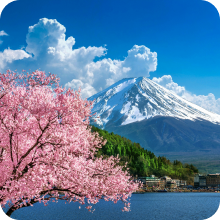Japan Travel Tips: Everything You Need to Know
Japan is a country that effortlessly blends the old with the new, where ancient temples stand in the shadow of towering skyscrapers, and where tradition meets modernity in the most unexpected ways. Whether you're a seasoned traveler or planning your first trip, Japan has a way of captivating your heart with its charm. However, traveling in Japan can be a bit different from what you might be used to, so having some insider tips up your sleeve will ensure your journey is as smooth as a cup of matcha.
Table of Contents
Planning Your Trip to Japan
Best Time to Visit Japan
Japan is a year-round destination, but when to visit depends on what you want to experience. Spring, with its famous cherry blossoms, is a magical time, but it’s also the busiest. Autumn offers breathtaking foliage and a bit more tranquility. Winter brings fantastic skiing opportunities in places like Hokkaido, and summer, though hot, is filled with lively festivals. Plan according to your interests, and you won't be disappointed.
Visa Requirements and Travel Documents
Most visitors to Japan can enter without a visa for short stays, but it's always wise to check Japan’s official guidelines before you go. Ensure your passport is up to date and has enough validity beyond your travel dates. Travel insurance is also a must—it’s better to have it and not need it than to need it and not have it.
Travel Insurance
Japan is a safe country, but accidents and unexpected events can happen anywhere. Comprehensive travel insurance that covers health, accidents, and cancellations will give you peace of mind. Look for policies that include coverage for activities you plan to engage in, such as skiing or hiking, and make sure to keep your insurance details handy during your trip.
Navigating Japan’s Transportation System
Using the JR Pass
The JR Pass is a fantastic value if you plan on traveling between cities. It offers unlimited travel on JR trains, including the Shinkansen (bullet trains), for a set period. You can purchase it before arriving in Japan or, for a slightly higher price, in Japan itself. The pass is easy to use—just show it at the ticket gates, and you’re good to go. Remember, the pass doesn’t cover every train, so double-check your routes.
Public Transportation Tips
Japan’s public transportation system is nothing short of legendary. Trains and buses are punctual, clean, and cover just about every corner of the country. Get a Suica or Pasmo card for easy access to subways and buses—it’s a tap-and-go system that works across different cities. And yes, the rumors are true: talking on your phone on public transport is frowned upon, so keep it on silent and text instead.
Renting a Car
While public transport is top-notch, renting a car can be a good idea if you’re venturing off the beaten path. Hokkaido, Kyushu, and Okinawa are perfect for road trips. Just remember that driving is on the left side of the road, and you’ll need an International Driving Permit (IDP). Parking can be a challenge in cities, but it's generally easier in rural areas.
Accommodation Options in Japan
Staying in Traditional Ryokans
If you’re looking to immerse yourself in Japanese culture, staying in a ryokan is a must. These traditional inns offer tatami-mat rooms, futons, and often include a kaiseki meal (a multi-course dinner). The experience is a step back in time, offering a glimpse into Japan’s serene way of life. Remember to remove your shoes before stepping onto the tatami mats!
Modern Hotels and Hostels
Japan has no shortage of accommodation options, from luxury hotels to budget-friendly hostels. Business hotels are a great option for solo travelers or couples, offering compact but efficient rooms. Hostels in Japan are clean, safe, and often provide private rooms in addition to dorms. Booking in advance, especially during peak seasons, is highly recommended.
Unique Stays
For something different, try a capsule hotel—these tiny, pod-like spaces are surprisingly comfortable and budget-friendly. Temple lodgings, or Shukubo, offer a spiritual retreat with the chance to join monks in meditation and enjoy vegetarian meals. Airbnb is also widely available in Japan, providing a homey alternative to hotels, especially in cities like Tokyo and Kyoto.
Cultural Etiquette and Customs
Dos and Don’ts in Japan
Japan is a country of etiquette, and following local customs is important. Bowing is a common greeting, though a nod is often enough for tourists. Avoid tipping, as it’s not part of Japanese culture and can even be considered rude. Always carry a small bag for your trash, as public bins are scarce. And, when visiting temples or shrines, be respectful—wash your hands at the entrance, and bow before entering the main hall.
Language Tips
While English is becoming more common, especially in major cities, a few Japanese phrases will go a long way. “Sumimasen” (excuse me) is incredibly versatile, and “Arigatou” (thank you) will be appreciated. Consider downloading a translation app like Google Translate or learning a few basics from a language guidebook. The effort will be noticed and respected by locals.
Dining Etiquette
Dining in Japan is a delightful experience, but it comes with its own set of rules. Slurping your noodles is not only acceptable but encouraged—it shows you’re enjoying the meal. However, never stick your chopsticks upright in a bowl of rice, as this resembles a funeral rite. If you’re eating sushi, it’s polite to eat the whole piece in one bite. And remember, no tipping—the service charge is included in your bill.
Thanks for visiting our blog, are you planing to travel to Japan? Check out our eSIM Japan.

Money Matters in Japan
Currency and Payment Methods
Japan is still a largely cash-based society, so it’s a good idea to carry yen with you. ATMs can be found in convenience stores like 7-Eleven, which accept international cards. Credit cards are widely accepted in urban areas, but cash is king in rural parts. It’s also wise to have small denominations, as some places may not accept large bills.
ATMs and Exchange Services
Finding an ATM that accepts foreign cards can be a challenge outside major cities, but convenience stores are a reliable option. If you need to exchange currency, do so at the airport or at major banks in the city. Currency exchange rates are generally better at official exchange services than at hotels or tourist spots.
Tipping Culture in Japan
Tipping is not practiced in Japan and can even cause confusion or embarrassment. Exceptional service is the norm, and employees take pride in their work without expecting extra compensation. If you’re particularly grateful, a simple “Arigatou gozaimasu” and a smile will do the trick.
Exploring Japan’s Food and Drink Scene
Must-Try Dishes
Japan’s culinary scene is one of the highlights of any trip. From sushi and ramen to tempura and okonomiyaki, there’s something to delight every palate. Don’t leave without trying some street food, like takoyaki (octopus balls) or taiyaki (fish-shaped cakes filled with sweet bean paste). And if you’re feeling adventurous, head to a conveyor belt sushi restaurant for a fun and interactive dining experience.
Navigating Dietary Restrictions
While Japan is known for its seafood and meat dishes, vegetarian and vegan options are becoming more available, especially in larger cities. Look for restaurants that specialize in shojin ryori, the traditional Buddhist vegetarian cuisine. Gluten-free travelers may face more challenges, as soy sauce is a common ingredient, but many restaurants are accommodating if you explain your needs.
Japan’s Drinking Culture
Japan’s drinking culture is an integral part of its social fabric. Sake, the traditional rice wine, is a must-try, but don’t overlook the local beers and shochu (a distilled spirit). Izakayas, Japan’s version of pubs, are great places to unwind and sample a variety of dishes. Just remember, when you’re drinking with others, it’s polite to wait for everyone’s glass to be filled before taking a sip.
Safety and Health Tips
Staying Safe in Japan
Japan is one of the safest countries in the world, with low crime rates and a high level of public order. However, it’s still important to be cautious—keep an eye on your belongings in crowded areas, and be aware of common scams targeting tourists, like overpriced taxis or fake monks asking for donations. Emergency services can be reached by dialing 110 for police or 119 for ambulance and fire.
Health Precautions
Japan has excellent healthcare facilities, but medical treatment can be expensive without insurance. It’s a good idea to carry a basic first-aid kit and any necessary medications. If you need medical assistance, many hospitals in major cities have English-speaking staff, but it’s always useful to have a translation app on hand. Tap water in Japan is safe to drink, and hygiene standards are high, so food safety concerns are minimal.
Traveling with Medication
If you’re bringing prescription medication, make sure it’s legal in Japan—some common medications in other countries are restricted. It’s wise to carry a copy of your prescription and a letter from your doctor explaining your condition. Declare any medications at customs upon arrival to avoid any issues.
Before you take off make sure to check with local government of the travel status.
FAQs
Do I need a visa to travel to Japan?
Many countries have visa exemptions for short-term stays, but check Japan’s official guidelines.
Is Japan expensive to visit?
Japan can be pricey, but budgeting and planning can help you manage costs effectively.
Can I get by with only English in Japan?
While English is not widely spoken, major tourist areas often have English signs. Learning basic Japanese phrases can be very helpful.
What’s the best way to get around in Japan?
The JR Pass is great for long-distance travel, while public transportation like subways and buses work well within cities.
Are credit cards widely accepted in Japan?
Credit cards are accepted in most urban areas, but it’s advisable to carry cash, especially in rural regions.















